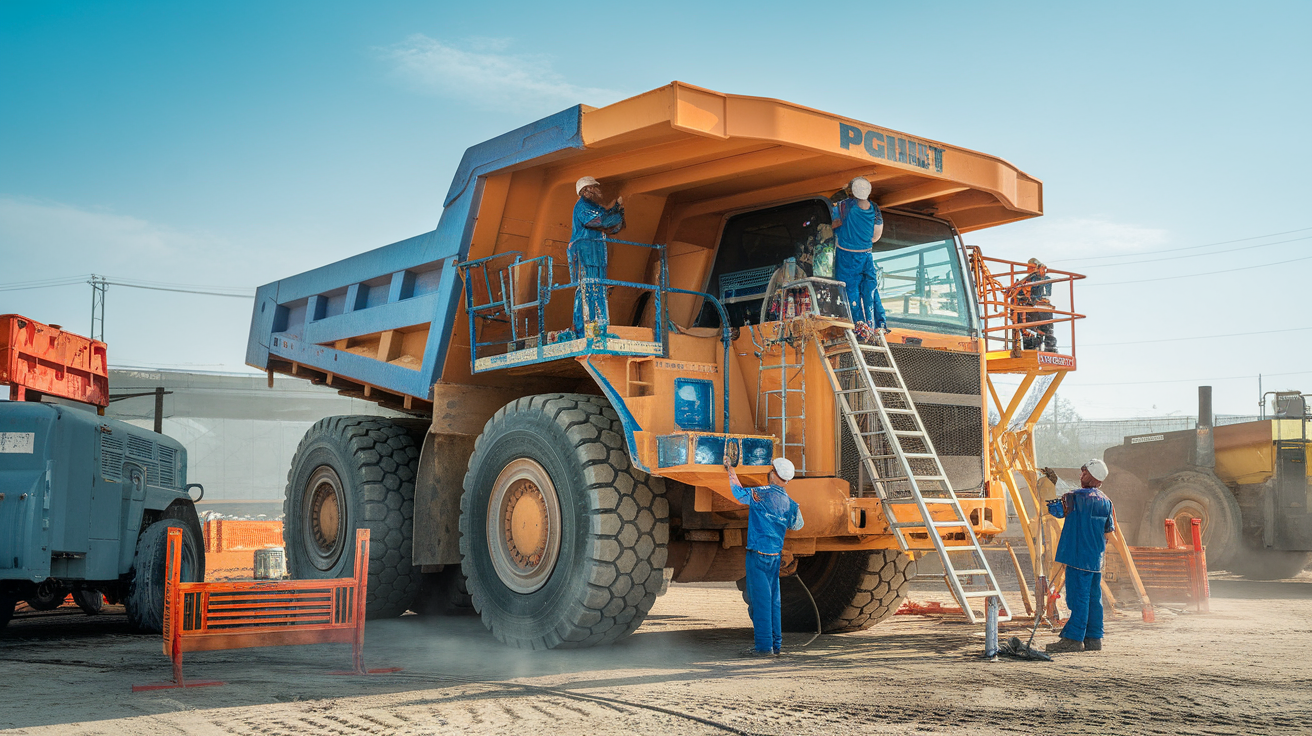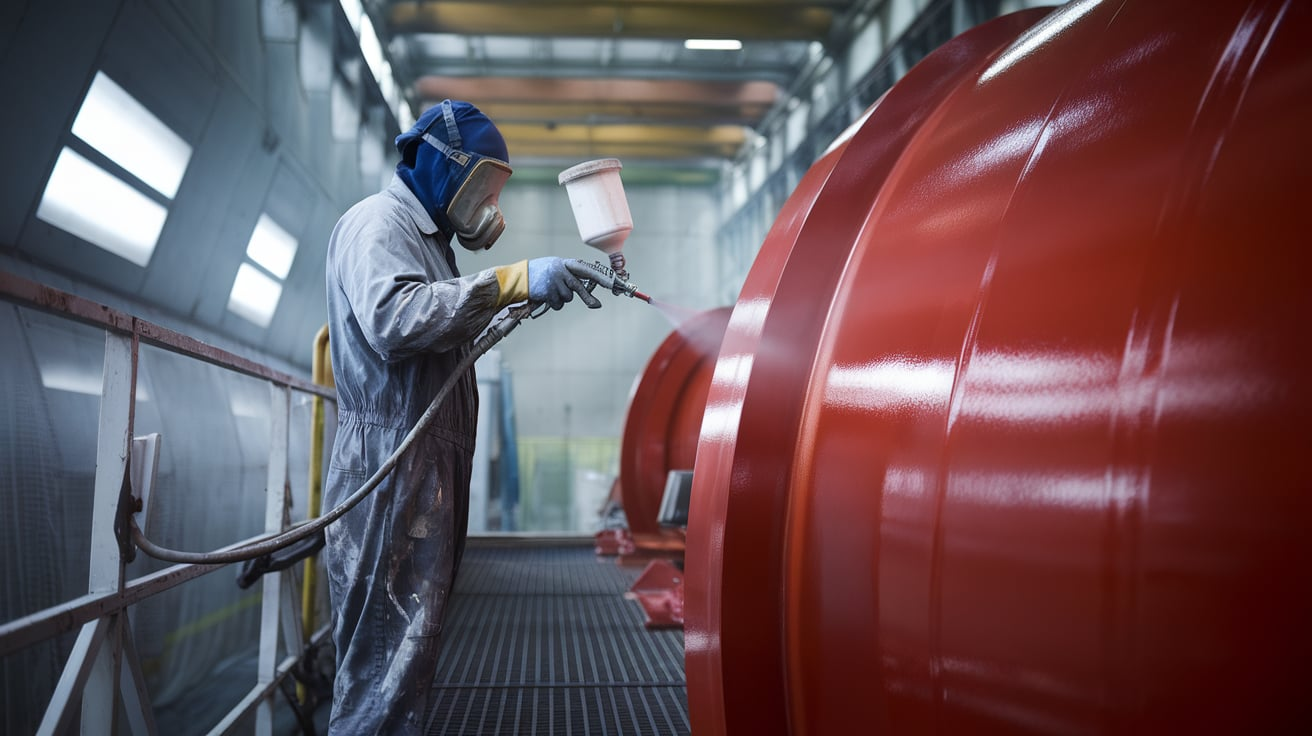Painting industrial equipment isn’t just about looks; it’s key to protection, performance, and meeting safety standards.
Having worked with enough machinery, I know rust, wear, and chemical exposure can cause major damage without the right coatings.
A professional paint job not only refreshes equipment but also extends its life and reduces downtime.
In this blog, I’ll cover what to expect from industrial painting services, the best coatings to use, and how to choose the right contractor.
If your equipment needs a refresh or you want to protect new machinery, you’re in the right place.
Why Industrial Equipment Needs Professional Painting

Painting heavy industrial equipment is crucial for protection, performance, and compliance.
Uncoated metal is vulnerable to rust, corrosion, and chemical damage, but professional coatings create a durable barrier that shields your machinery.
Beyond protection, paint improves safety by providing high-visibility colors and OSHA-compliant markings, making it easier to spot equipment boundaries and hazards.
Regulatory requirements from agencies like OSHA and the EPA often call for specific coatings and labeling, and professionals ensure these standards are met.
A well-painted machine also maintains resale value, showing potential buyers you’ve cared for the equipment.
If you’re investing in heavy equipment, professional painting ensures long-term protection.
Costs Involved in Heavy Equipment Painting
The cost of painting heavy equipment can vary depending on several factors. Here’s a breakdown of what you can expect:
- Price Range: Typically, you’ll pay between $10 – $25 per square foot, or $1,000 – $10,000 per machine, depending on size, complexity, and surface condition.
- Preparation Costs: Removing rust, oil, or old paint adds to the cost, as it requires time and skill.
- Coating Type: Urethanes and epoxy systems are pricier but offer better protection and longevity compared to standard industrial enamel.
- Mobile Painting Services: On-site painting tends to cost more due to travel, setup, and environmental control.
- Additional Charges: Extra fees may apply for confined space work, multiple colors, or custom logos.
While the initial cost may seem high, quality coatings can lower long-term maintenance costs and extend the life of your equipment.
Common Types of Heavy Equipment That Require Painting
Learn the key categories of industrial and commercial machinery that benefit most from professional painting for durability, protection, and compliance.
- Construction Machinery: These machines are constantly exposed to dirt, moisture, and abrasion. Professional coatings protect them from rust and wear while also improving visibility and safety on job sites.
- Manufacturing Equipment: In factories, machinery is often exposed to chemicals, oils, and high temperatures. Industrial coatings protect surfaces from corrosion, facilitate cleaning, and ensure equipment compliance with hygiene or operational standards.
- Oilfield and Mining Tools: These environments are some of the harshest. Heavy-duty coatings are essential for resisting chemicals, extreme temperatures, and impact damage, ensuring tools remain safe and functional under pressure.
- Agricultural and Marine Machinery: Tractors, harvesters, and boats often operate in wet or salty conditions. Specialized paint systems prevent corrosion, resist fading from sunlight, and help maintain performance in demanding outdoor environments.
How Long Does Industrial Equipment Painting Last?
A quality industrial equipment paint job can last 5 to 10 years, depending on how often the equipment is used and where it operates.
In milder, controlled environments, paint tends to hold up longer. But exposure to chemicals, salt, UV rays, or rough handling wears it down faster.
Frequent use or operation in extreme conditions may require touch-ups or full recoats sooner.
The longevity of your finish also comes down to prep work, like sandblasting, degreasing, and proper priming, which are essential.
When done right, industrial coatings resist rust, moisture, and abrasion far better than quick fixes.
Working with experienced pros ensures a longer-lasting, cost-effective result that protects your investment and reduces the need for constant maintenance.
Industrial Equipment Painting Services

Get expert painting services tailored for heavy-duty machinery. From rust prevention to regulatory compliance, professional coatings protect your investment and ensure durability in the harshest industrial environments.
1. Industrial Painting USA
Industrial Painting USA brings over 40 years of experience to nationwide machinery painting projects.
They specialize in corrosion-resistant coatings, high-performance finishes, and flexible scheduling to minimize operational downtime.
Their team is well-versed in industrial standards and delivers consistent, long-lasting results.
They handle everything from small components to full-scale equipment restoration with precision and professionalism.
2. Painters USA
Painters USA is a woman-owned company offering industrial-grade machinery painting, rust protection, and specialty coatings.
Their crews are OSHA-trained and equipped to work in active facilities with minimal disruption. They use high-quality paints designed for durability and compliance.
Known for excellent customer service and detailed project planning, Painters USA is a top choice for nationwide equipment painting needs.
3. Induspray USA
Induspray USA has specialized in on-site painting of industrial machinery since 1975.
Their experience covers a wide range of equipment, including metal presses, conveyors, and robotic systems.
Utilizing airless spray techniques and industrial-grade coatings, they efficiently restore and protect large-scale equipment.
Their service is ideal for manufacturers looking to update or maintain their assets with minimal production delays.
4. SAG Heavy Equipment
SAG Heavy Equipment is known for one of the largest industrial paint booths in North America.
They provide complete heavy equipment restoration, including sandblasting, priming, and high-gloss finishing.
Whether it’s excavators, loaders, or custom rigs, their team ensures a clean, even, and weather-resistant coating.
Their facility-based approach ensures controlled conditions and optimal results for large machinery.
5. Newman Tractor
Newman Tractor has over 40 years of experience in painting and restoring heavy-duty equipment.
They operate advanced paint booths and offer sandblasting, surface prep, and refinishing for all types of industrial machines.
Their coatings are designed for use in rugged environments and offer long-term wear resistance.
Newman Tractor is also recognized for its appearance on the “Deconstruction” YouTube series, which highlights its hands-on expertise.
Benefits of Hiring Professional Painters
Understand the advantages of choosing expert industrial painters from safety-certified teams and superior finishes to efficient project timelines and advanced tools.
- OSHA-Trained Crews: Professional industrial painters are often OSHA-certified, ensuring safety when working around hazardous equipment, heights, and confined spaces. This reduces accident risk and ensures compliance with safety standards.
- Long-Lasting Results: Professionals use high-performance coatings that resist rust, chemicals, and weather conditions, plus proper prep techniques like sandblasting for a durable, long-lasting finish.
- Time-Efficient Turnaround: Skilled painters work quickly, minimizing downtime and sticking to schedules, even for large projects with tight timelines.
- Specialized Equipment: Experts use the right tools, boom lifts, electrostatic sprayers, and curing equipment, ensuring smooth, even coverage for a safer, more efficient job.
Choosing the Right Industrial Painting Contractor
Finding a skilled contractor ensures your equipment is coated correctly, lasts longer, and meets safety standards. Here’s what to evaluate:
1. Certifications and Insurance
Choose a contractor with proper certifications like NACE, SSPC, or OSHA compliance. These credentials prove they follow industry-standard safety and coating practices.
Equally important, verify that they carry liability and workers’ compensation insurance.
This protects both you and their crew during on-site work, especially for high-risk industrial environments or projects involving hazardous coatings.
2. On-site vs. Off-site Capabilities
Determine if the contractor offers mobile services or requires off-site painting.
On-site work is ideal for stationary or oversized equipment, while off-site options provide controlled environments for a high-quality finish.
Your choice depends on convenience, equipment mobility, and exposure to contaminants.
A contractor who offers both options gives you flexibility and helps minimize downtime during the process.
3. Project Portfolio and Reviews
Review examples of past projects that match your industry or equipment type. High-quality before-and-after images and a strong portfolio reflect real-world expertise.
Look for consistent positive feedback in online reviews and request client references.
This gives insight into reliability, work quality, and how the contractor handles deadlines, prep work, and follow-up support
Tips for Maintaining Painted Equipment
Learn simple maintenance tips that help preserve your equipment’s painted surfaces, prevent corrosion, and extend the life of industrial coatings.
- Wash regularly: Remove dirt, salt, and chemicals to prevent corrosion and buildup.
- Inspect for chips: Look out for scratched or damaged areas that expose metal.
- Keep a touch-up kit: Have color-matched paint and small tools ready for minor fixes.
- Schedule recoating: Plan periodic recoats to maintain protection, especially for high-wear zones.
- Store equipment properly: Shield machines from UV and weather when not in use by storing them in a sheltered location.
Conclusion
Painting heavy industrial equipment professionally is one of the smartest moves you can make for long-term reliability and protection.
I’ve seen what happens when businesses skip proper prep or use the wrong paint; it flakes, rusts, and costs way more in the long run.
A solid industrial coating protects against corrosion, chemicals, UV, and daily wear, and that peace of mind is worth every penny.
If you’re updating your gear’s look or shielding it from tough conditions, expert application and quality materials matter more than you think.
If you’re planning a project or just starting to explore options, feel free to reach out.
Drop a question in the comments, send a message, or request a quote. I’m always happy to help you protect what keeps your business running.

